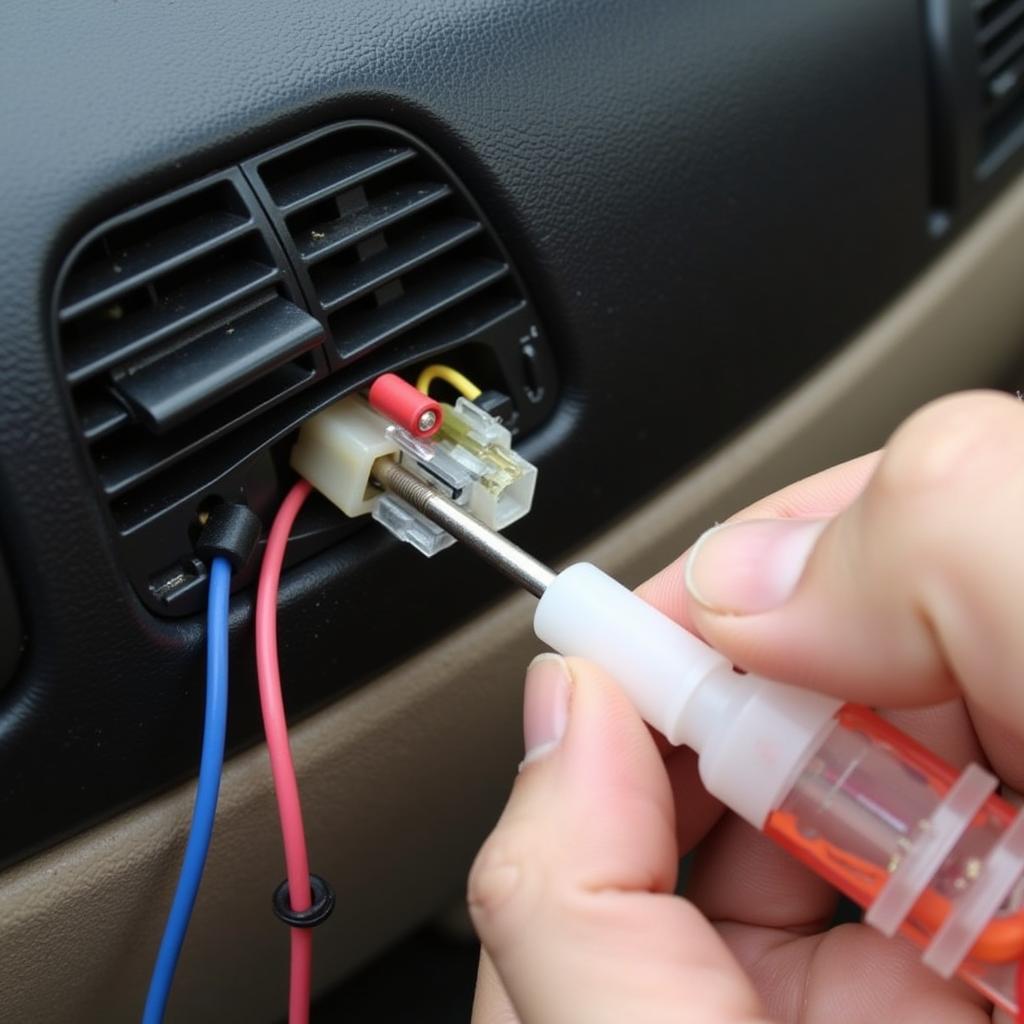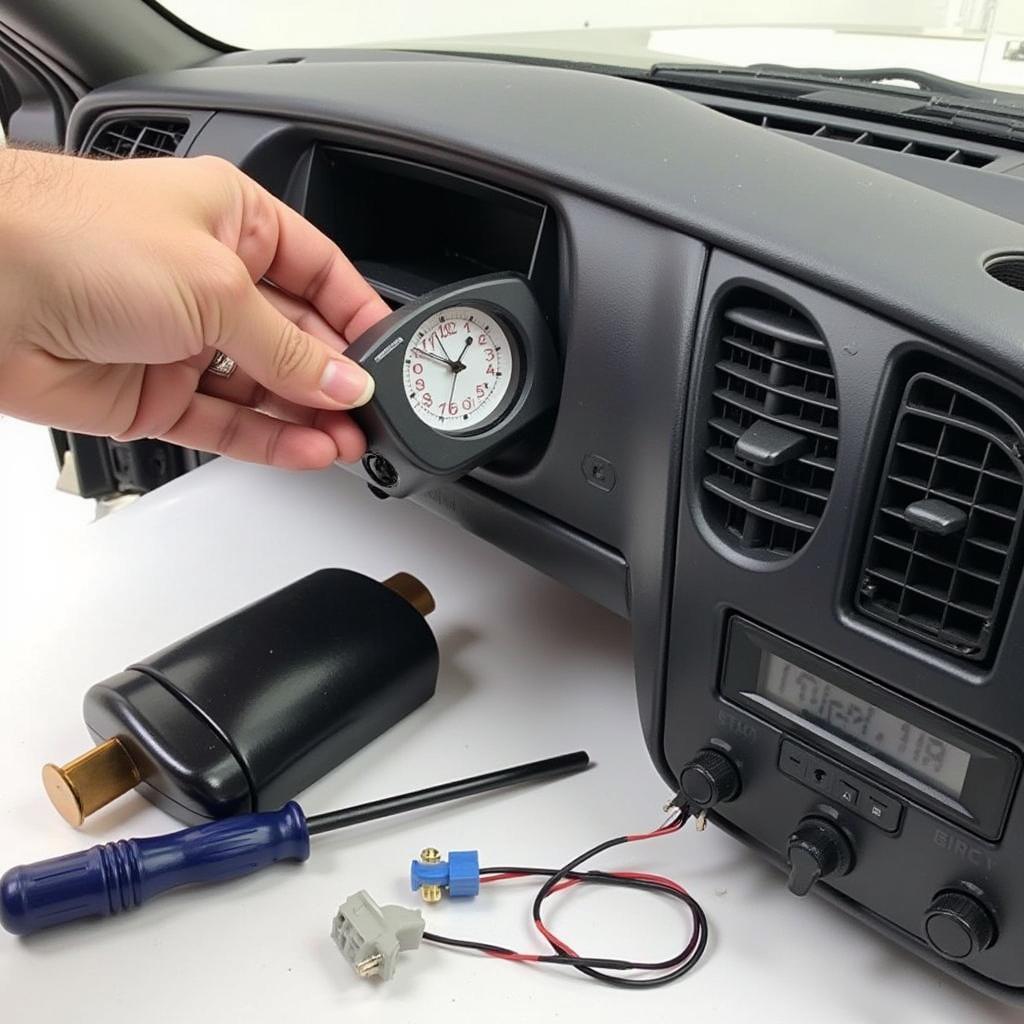If your car clock loses time when the engine is off, you’re not alone. This is a common issue that can be caused by a variety of factors, from a simple loose wire to a more complex electrical problem. This article will walk you through the common causes, troubleshooting steps, and solutions for a car clock that loses time when the engine is off.
Why Does My Car Clock Lose Time When the Engine Is Off?
Several reasons can explain why your car clock loses time. Understanding these can help you pinpoint the problem and find the right fix.
Weak Car Battery
A weak or dying car battery is often the culprit. Your car clock, like other electronic components, relies on a constant power supply from the battery, even when the engine is off. If the battery is struggling, it may not provide sufficient power to keep the clock running accurately. This can manifest as the clock resetting or slowing down.
Faulty Wiring or Loose Connection
A loose or corroded wire connecting the car battery to the clock can disrupt the power supply, causing the clock to lose time. This can also happen with the wiring within the clock itself. Sometimes, simply reconnecting or cleaning the terminals can solve the problem.
Failing Clock Mechanism
Over time, the internal components of the car clock can wear out, leading to inaccurate timekeeping. This is especially true for older vehicles. If other electrical components are working fine and the battery is healthy, a faulty clock mechanism is a likely cause.
Aftermarket Car Stereo Installation Issues
If you recently installed an aftermarket car stereo, it might have inadvertently disrupted the clock’s power supply. Incorrect wiring during installation can cause the clock to lose power when the engine is off. Double-checking the wiring connections is essential.
Troubleshooting a Car Clock That Loses Time
Here’s a step-by-step guide to help you troubleshoot the issue:
-
Check the Battery: The first step is to check your car battery’s voltage. A healthy battery should read around 12.6 volts when the engine is off. If the voltage is significantly lower, the battery is likely the problem.
-
Inspect the Wiring: Visually inspect the wiring connected to the car clock and battery for any signs of damage, corrosion, or loose connections. Pay attention to the fuses related to the clock circuit as well. A blown fuse can also be the reason for the clock malfunction.
-
Check the Car Stereo Wiring (If Applicable): If you’ve recently installed an aftermarket car stereo, carefully review the wiring diagram and verify that the clock’s power supply is correctly connected.
-
Test the Clock Itself: If the battery and wiring seem fine, the clock mechanism itself might be faulty. You can try disconnecting the clock and connecting it directly to a 12V power source to see if it functions correctly.
 Inspecting Car Clock Wiring and Connections
Inspecting Car Clock Wiring and Connections
Fixing the Problem
Depending on the cause, the fix can range from simple to complex:
- Replace the Battery: If the battery is weak, replacing it will likely solve the problem.
- Repair or Replace Wiring: If the wiring is damaged or corroded, repair or replace the affected sections.
- Replace the Clock: If the clock mechanism is faulty, replacing the clock is the most effective solution.
- Correct Car Stereo Wiring: If the aftermarket car stereo installation is the issue, consult the wiring diagram and reconnect the clock’s power supply correctly.
“A simple voltage check can save you a lot of time and trouble. Always start with the basics when troubleshooting electrical issues,” advises John Miller, ASE Certified Master Technician.
 Replacing a Car Clock in the Dashboard
Replacing a Car Clock in the Dashboard
Conclusion
A car clock losing time when the engine is off is a common issue with several potential causes. By following the troubleshooting steps outlined above, you can identify the root cause and fix the problem. Remember to check your battery, inspect the wiring, and consider the impact of any recent car stereo installations. If you need further assistance, feel free to connect with us at AutoTipPro. Our team of expert technicians is ready to help. Call us at +1 (641) 206-8880 or visit our office at 500 N St Mary’s St, San Antonio, TX 78205, United States. Don’t let a faulty clock disrupt your schedule!
“Don’t underestimate the importance of a properly functioning car clock. It’s not just about telling time; it can also be crucial for tracking trip durations and maintaining schedules,” adds Sarah Chen, Automotive Electrical Engineer.
FAQ
-
Could a blown fuse cause my car clock to lose time? Yes, a blown fuse in the clock’s circuit can interrupt the power supply and cause the clock to malfunction.
-
How often should I replace my car battery? Car batteries typically last 3-5 years, but various factors can affect their lifespan.
-
Is it difficult to replace a car clock myself? Replacing a car clock is usually a relatively simple DIY task. However, consult your car’s manual for specific instructions.
-
Can extreme temperatures affect the car clock? Extreme temperatures, both hot and cold, can potentially impact the performance and lifespan of electronic components, including the car clock.
-
What if I’ve tried everything and the clock still loses time? If you’ve exhausted all troubleshooting steps, it’s best to consult a qualified auto electrician for further diagnosis and repair.
-
Can a parasitic draw cause the car clock to lose time? Yes, a parasitic draw, which is a constant drain on the battery even when the car is off, can weaken the battery and cause the clock to lose time.
-
Is it safe to drive with a car clock that’s losing time? While driving with a malfunctioning clock is generally safe, it can be inconvenient. Addressing the underlying issue is recommended.




Leave a Reply